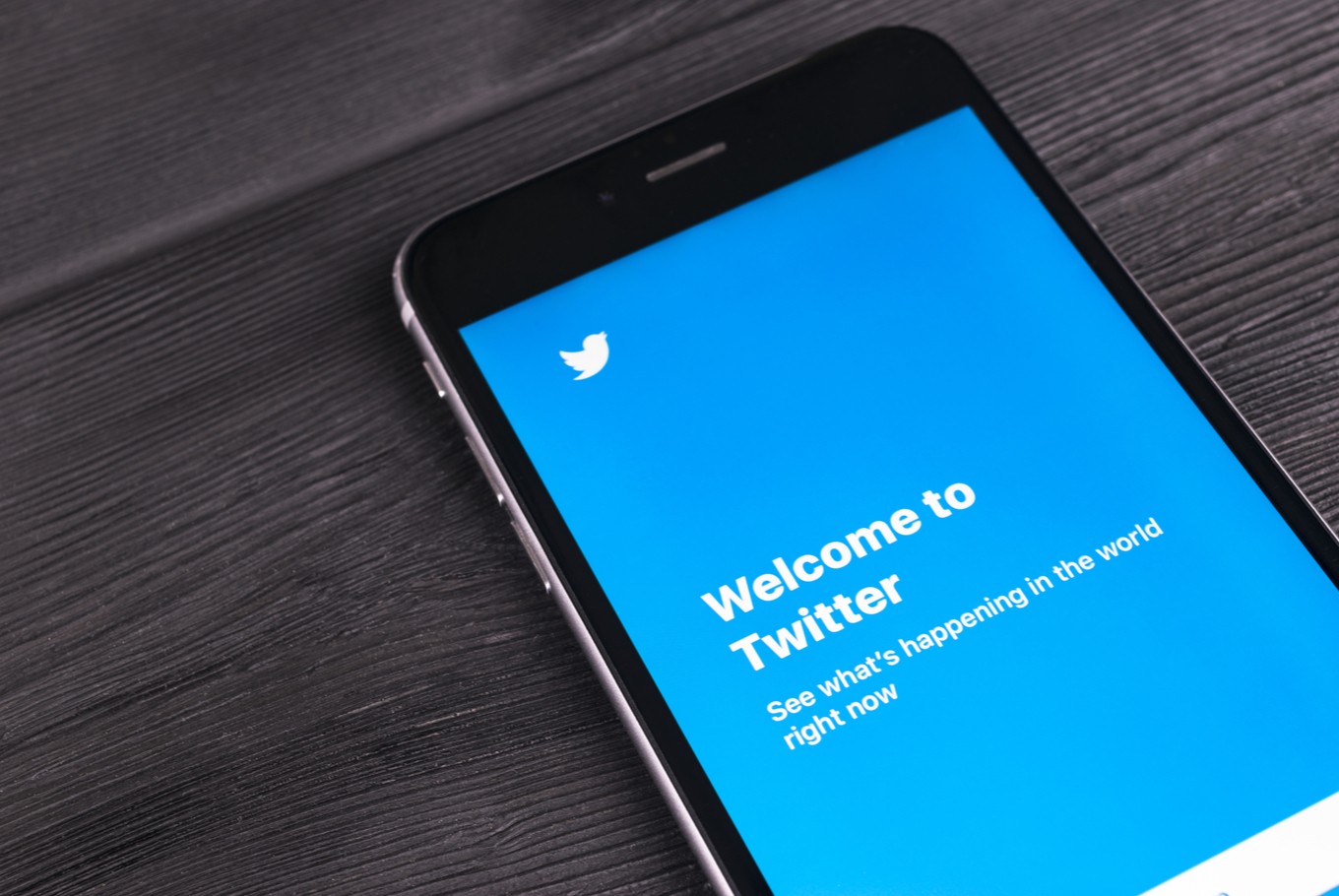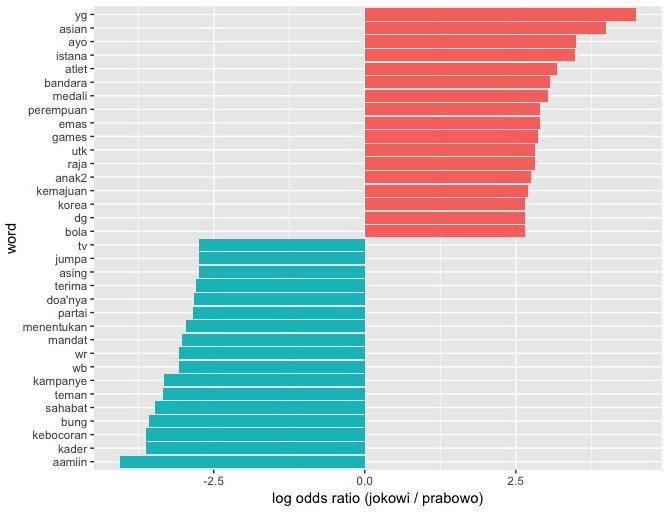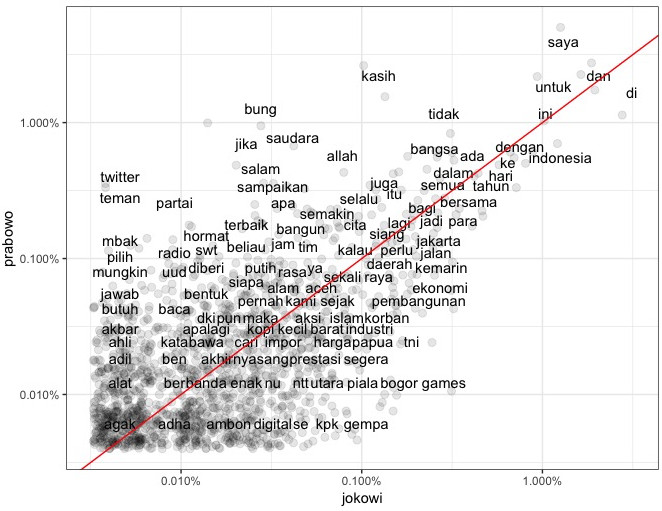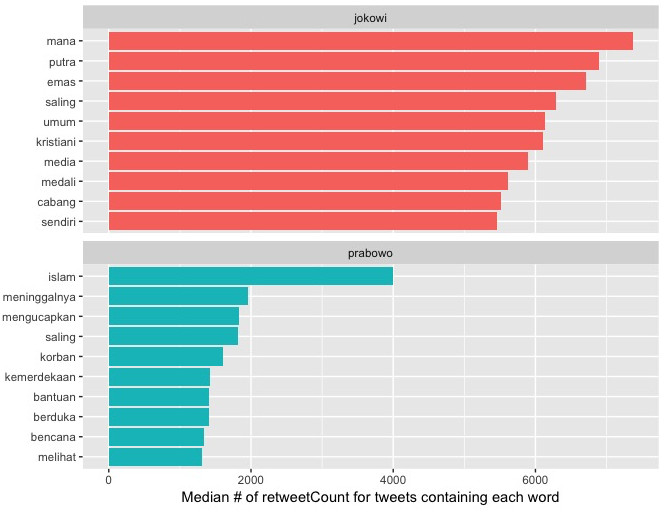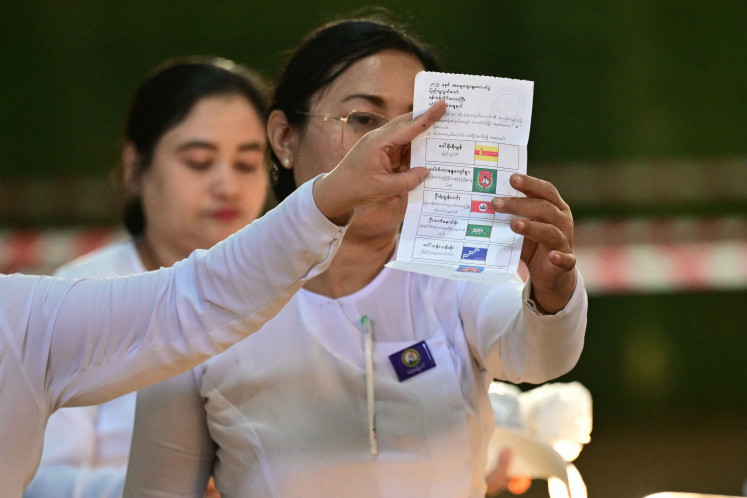Popular Reads
Top Results
Can't find what you're looking for?
View all search resultsPopular Reads
Top Results
Can't find what you're looking for?
View all search resultsWhat can tweets reveal about Jokowi and Prabowo?
By analyzing their 1,400 tweets in over one year, we try to unravel their characteristics and how they have tried to present themselves to the public and their constituents.
Change text size
Gift Premium Articles
to Anyone
T
witter has emerged as an important platform to understand the position of political leaders on various social, political and economic issues. President Joko “Jokowi” Widodo and his challenger Prabowo Subianto are active on Twitter for expressing their positions on many national issues, while also using the platform to convey congratulatory messages.
By analyzing their 1,400 tweets in over one year, we try to unravel their characteristics and how they have tried to present themselves to the public and their constituents. The analysis was done using data science tool Tidyverse package in R.
The analysis was done using data science tool Tidyverse package in R. (Taberez Ahmed/File)An analysis of tweets of both Jokowi and Prabowo reveal many interesting patterns. The incumbent Jokowi focuses a lot on achievements, development and include congratulatory messages. We can see it from the use of the words atlet (athlete), medali (medals), emas (gold), and games which were used to expressed to celebrate the achievements during the 2018 Asian Games. The word bandara (airport) suggests a similar pattern. Jokowi’s administration has made huge investments in the development of country’s infrastructure. Multiple projects have been launched including toll roads and new airports in various islands. His supporters like to recall his campaign slogan during the 2014 presidential election: “kerja, kerja, kerja” (work, work, work). His cabinet is also called Kabinet Kerja or the Working Cabinet.
In contrast, Prabowo’s word choices are comparatively formal and politically oriented. The most used word, bung [brother], refers to the egalitarian way of calling men including male political leaders and intellectuals, commonly used during the anti-colonial struggle, and the title is usually attached to the first president Sukarno’s nickname, Bung Karno. Prabowo himself has visibly attempted to emulate Bung Karno such as in his dress style, to gain the support of potential voters. The word kader (cadre) suggests that he tweets a lot about his political party Gerindra and the cadres. The use of the word sahabat (friend) suggests a certain level of friendliness in Prabowo’s tweets to his followers. However, this word is rather formal especially for young speakers of Indonesian.
Prabowo’s use of the word mandat (mandate) suggests that he sees himself as a leader focusing on fulfilling the mandate— likely to lead the country. This may be linked with the use of the word asing (foreign). For years now Prabowo has been vocal against what he calls foreign influences to boost his nationalist image. The imaginary threat of anything foreign has often been used by populist leaders globally including Prabowo.
This graph shows the comparison of the frequency of word use in Jokowi and Prabowo tweets. The analysis was done using data science tool Tidyverse package in R. (Taberez Ahmed/File)This graph shows the comparison of the frequency of word use in Jokowi and Prabowo tweets. Like the previous graph, Prabowo’s tweets reveal his focus more on formal and political terms such as bung, saudara (brothers), bangsa (nation) and partai (party). Jokowi, however, does not use such words. This signifies how Prabowo frames himself as a strong nationalist leader, while Jokowi — perhaps avoiding the formal and political terms — paints himself as approachable and non-formal. Jokowi rather focuses on achievements and development — as reflected in his frequent mention of ekonomi (economy), pembangunan (development), industri (industry), piala (trophy), and games. Gempa (earthquake) and korban (victim) are also in Jokowi’s tweets but it is not visible in Prabowo’s. The latter words refer to the series of natural disasters and the Lion Air JT610 plane crash last year.
This graph shows the difference between retweeted words of Jokowi and Prabowo. The analysis was done using data science tool Tidyverse package in R. (Taberez Ahmed/File)A most interesting pattern is the difference between retweeted words of Jokowi and Prabowo. Prabowo’s most retweeted tweets contain the word “Islam”. This is consistent with Prabowo’s focus on his populist appeal and gaining Islamist groups support throughout the years. In 2018, particularly, Prabowo and his team were very close with Islamic Defenders Front (FPI) and the Islamists’ “212” rallies. Words such as korban (victim), bantuan (aid or help), and bencana (disaster) also reveal his followers’ interest in more sympathetic expressions by Prabowo.
Although Jokowi also makes use of his connections with Islamic groups, as he chose chairman of Indonesian Ulema Council Ma’ruf Amin as his running mate, Jokowi’s most retweeted words also focus on achievement, such as emas (gold) and medali (medal), likely related to the 2018 Asian Games. The analysis of tweets certainly reveals very different characteristics of both these leaders. While Jokowi has found a match to counter Prabowo’s populist appeal among conservative Muslims through the choice of Ma’ruf and seems to have an upper hand at the moment, the campaign is going to intensify in the coming days and Prabowo is more likely to sharpen his populist rhetoric.
***
Annisa Ridzkynoor Beta is a Postdoctoral Fellow and Taberez Ahmed Neyazi is Assistant Professor at the Department of Communications and New Media, National University of Singapore.

